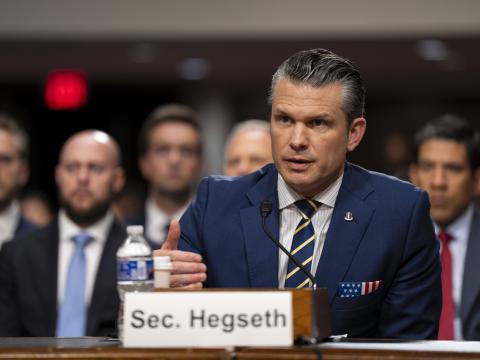Deputy Secretary of Defense Describes Defense Plans Under the New Administration
Referring to Washington, D.C. as its own area of responsibility, Deputy Secretary of Defense William J. Lynn, cited several figures from the recently released proposed U.S. Defense Department budget that illustrate the new administration's changing focus. "From now on, irregular warfare is a regular part of our plan," he said.
Referring to Washington, D.C. as its own area of responsibility, Deputy Secretary of Defense William J. Lynn, cited several figures from the recently released proposed U.S. Defense Department budget that illustrate the new administration's changing focus. "From now on, irregular warfare is a regular part of our plan," he said.
Speaking first about force structure, Lynn pointed out that plans to change the number of forces in the armed services have shifted. At the same time, the proposed budget increases financial support to the needs of military personnel by 9 percent; the amount proposed to help wounded warriors also has been increased by $3 billion.
To support President Obama's dedication to fiscal responsibility, the deputy secretary reiterated the administration's commitment to put the entire cost of current operations within the department's budget, eliminating the supplementals that had become common place during the past administration. This move also maintains the president's goal for transparency in government spending, he added. The budget also allows for a new type of defense that breaks all the conventional thinking that has not been effective in fighting an unconventional threat, he added. This includes funding to support the Capstone Concept for Joint Operations.
Admitting that reforming the Defense Department's funding and focus has been promised but has not succeeded in the past, Lynn stated that in his more than 30 years of government service, he believes this, the biggest reform he has seen, will truly occur. He pointed to several examples, including a dedication to pursue proven instead of promised solutions. In addition, when given the choice between a service-centric and a multiservice-centric solution, the department will choose the latter.
Lynn acknowledged that the military forces as well as the general public have lost confidence in the department's ability to deliver products on time and on budget. As a result, a number of initiatives have been announced to address is issue. First, the acquisition work force will be increased by 9,000 new hires, and shifts in working with contractors will add another 11,000 personnel to the acquisition force. Second, the department plans to bring discipline to the requirements process. Third, military procurement professionals and contractors will be required to improve their cost estimations. Fourth, the acquisition phase itself will be strengthened. And fifth, poorly performing programs will be cancelled, Lynn said.
These changes will not be easy, he admitted, but he believes that the department will succeed because of what he called "the perfect storm:" a president who is dedicated to change, a congress that is willing to act and a Defense Department that is willing to work hard and is dedicated to reform.




Comments